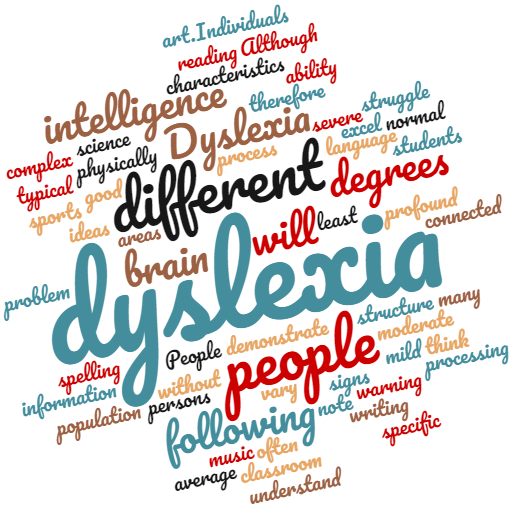He rubs his sweaty palms against his shirt. It’s almost his turn and he’s not ready yet, he doesn’t think he can ever be. His eyes are heavy and tired, his sleep sacrificed to hours and hours of trying to understand the lessons of the previous day. Without any help, it usually takes longer than usual. And now this, an impromptu recitation of the short paragraph that his teacher had placed before him. And this teacher has little patience for slow readers.
He looks at the sheet of paper again, tries to get the words to make sense as he recites them under his breath. All he gets in return is the throbbing of his head and the blurring of the words. He wishes he could blame sleep deprivation for this, then at least he wouldn’t feel like such a dullard.
His name is called and he walks with shaky legs to the front of his classroom. The look his classmates give him mirrors the one of his teacher. This was a familiar situation. He would most likely stand in font of his class with his eyes cast down, fumble and mix up his words and sentences as he struggles to read them aloud, endure the snickers and jeers from his classmates as well as the ever-present looks of disappointment from various teachers.
Again, and again. Why is he so stupid? What is wrong with him? He rose the sheet of paper to read. This time, when the words blended together again, he knows it’s because of his tears.
As is the case with any disorder, society often makes an assessment based on incomplete information, thereby misjudging those with a disorder. Dyslexia is one of such disorders. In a society like ours, it is important to not be ignorant of various learning disorders that often go unrecognized and mislabelled in order to improve the quality of the educational processes in the various stages of education.
WHAT DYSLEXIA IS
Dyslexia is a developmental language disorder that involves a deficit in phonological processing. Simply put, it is a difficulty in understanding words or even numbers, thereby impairing a person’s ability to read, write and spell. It is a specific learning difficulty that among other things, can impact on an individual’s ability to break down words down into phonemes, a crucial skill involved in reading, writing and spelling. Dyslexia involves the ways that the brain processes graphic symbols and the sound of words. It commonly affects word recognition, spelling and the ability to match letters to sounds.
People with dyslexia may be highly intelligent and creative individuals but still struggle with basic literacy skills. The effects of dyslexia vary from person to person. People with the condition generally have trouble reading quickly and reading without making mistakes. They might also have trouble expressing themselves in writing and even in speaking.
The main problem in dyslexia is trouble recognizing phonemes. These are the basic sounds of speech, so it’s a struggle to make the connection between the sound and the letter symbol for that sound and to blend sound into words. This makes it hard to recognize short, familiar words or to sound out longer words. It takes a lot of time for a person with dyslexia to sound out a word. Because word reading takes more time and focus, the meaning of the word is often lost, and reading comprehension is poor. Dyslexia is a language processing disorder, so it can affect all forms of language, spoken or written.
Developmental dyslexia was first reported in 1896, by a British physician, W. Pringle Morgan, who described Parcy F., a young student who was bright in every way except for his inability to read. Today, over a century later, we continue to see bright children who struggle to read. Dyslexia is common. Some experts believe that 5-10% of people have it, while some others estimate that the prevalence is 17%.
WHAT DYSLEXIA IS NOT
Dyslexia is not a disease. It’s a condition a person is born with and often runs in families. Dyslexia is not a problem with vision. People sometimes think of it as reversing letters or seeing and writing words backwards. But reversals happen as a normal part of development and are seen in many children until the first or second year of primary education.
Dyslexia is not a problem with intelligence. While it is a neurological condition, dyslexia has no relation to intelligence. People with this condition are not stupid or lazy. Most have average or above average intelligence, and they work very hard to overcome their learning problems.
WHAT CAUSES DYSLEXIA?
Research has shown that dyslexia happen because of the way the brain processes information. Pictures of the brain show that when people with dyslexia read, they use different parts of the brain than people without dyslexia. These pictures also show that the brains of dyslexic people don’t work efficiently during reading. So that’s why reading seems like such slow, hard work.
Dyslexia is believed to be caused by an interaction of genetic and environmental factors. It can be inherited. It can also develop as a result of a traumatic brain injury, stroke or dementia in which case it is then called ‘acquired dyslexia’.
TREATMENT/MANAGEMENT
Reading is not natural, but is acquired and must be taught. For dyslexia, effective interventions should include training in letter sounds, phoneme awareness and linking letters and phonemes through writing and reading from texts at the appropriate level to reinforce emergent skills.
Dyslexia is typically diagnosed in childhood, so many dyslexia guides focus on helping children manage symptoms of this condition. But it often continues into adulthood. Dyslexia can go undetected in the early grades of schooling, therefore some children with dyslexia are not diagnosed until they reach adulthood, while some diagnosed adults find that their symptoms change as they age.
Dyslexia is a lifelong condition and it usually impacts more than just basic reading skills. Treatment involves adjusting teaching methods to meet the person’s needs. Tutors should use special learning and practice activities. While not curing the underlying problem, it may decrease the degree or impact of the symptoms.
Emotional problems often arise secondary to learning difficulties. There is also sometimes a stigma and negative attitude towards those dyslexia. If the instructors of a person with dyslexia lack the necessary training to support a child with the condition, there is often a negative effect on the student’s participation. This is why emotional support is also very important in dealing with dyslexia.
FAMOUS DYSLEXICS IN HISTORY
ALBERT EINSTEIN
Best known for his theory of relativity
ALEXANDER GRAHAM BELL
Inventor of the telephone
STEVEN SPIELBERG
Film director
NIKOLA TESLA
Discovered how light can be harnessed and distributed
MAGIC JOHNSON
Basketball Hall of Fame
MICHAEL FARADAY
Inventor of the electric motor
REFERENCES
https://kidshealth.org/en/teens/dyslexia.html
https://www.understood.org/en/learning-thinking-differences/child-learning-disabilities/dyslexia/what-is-dyslexia
https://www.mayoclinic.org/diseases-conditions/dyslexia/diagnosis-treatmentt
https://www.medicalnewstoday.com/articles/causes-of-dyslexia
https://www.lexercise.com/blog/dyslexia-vs-developmental-disabilities






This is so amazing!!! Literally made me know things I didn’t know. Keep up the good work!
This is so amazing!!! Literally learnt things I did know about. Keep up the good work!
Learnt things I didn’t know about. The brief story at the beginning, quite catchy to draw people like me who don’t like reading😹
I’m glad it worked😂
I’m amazed by this!! Keep up the good work.
Thank you for reading ❤️😊
Exposing me to new ideas, what an awesome write up, am skeptical about reading but this caught my attention… But I would like to ask a question?
Why are dyslexic more intelligent and smart?
Because dyslexic people have trouble learning how to read and write, they tend to work harder than usual to accomplish that. Asides that, they learn things differently and the peculiar way their brain works allows most of them to be big-picture thinkers and engage in more creative and spatial reasoning than the average person. However, symptoms of their condition vary in different individuals and the kind of help they get also goes a long way. I hope this answers your question somewhat. 😅